Hemp stakeholders in Israel are petitioning the government to clear up language in drug laws in order to legalize CBD for food, medicine, and general use, and make CBD products available over-the-counter.
Advocates submitted a position paper this week to the Ministry of Health calling for changes in conflicting language in the country’s Dangerous Drugs Ordinance. The changes would establish the legality of CBD products intended for consumption by humans and animals, said Boaz Wachtel, a long-time Israeli cannabis activist and co-founder and director at Australia-based medical cannabis and nutraceuticals maker Creso Pharma.
Israel’s Dangerous Drugs Ordinance now does not mention CBD but outlaws the use of any parts of the cannabis plant (both marijuana and hemp) except hempseed oil. Medical cannabis is exempt from the law and its use is permitted under doctor’s prescription, but CBD and hemp are prohibited for general, non-medical use in Israel. The ordinance states that “any part of the cannabis plant or its extraction is prohibited by law, except oil extracted from the seeds.”
Advocating EIHA position
The paper Wachtel submitted to the CBD committee of Israel’s Health Ministry advocates long-standing views held by the European Industrial Hemp Association that leaves and flowers, hemp extracts produced through traditional extraction methods and naturally occurring cannabinoids should be considered traditional ingredients for food and food supplements
Changes outlined in the position paper would open Israel for legal production and sales of CBD while giving patients an affordable option to the high-CBD drug Epidiolex, which is approved for sale under prescription in Israel but can cost as much as $32,000 annually.
“We want to give consumers and patients a non-prescription option to get CBD while assuring those products are produced under good manufacturing practices (GMP),” Wachtel said of the proposal, which renews previous initiatives to legalize CBD in Israel that stalled in the parliament.
Current status
In addition to prescription-only Epidiolex, Israeli consumers currently have access to individual orders of non-medicine CBD from abroad, which customs officials have generally allowed to pass despite an existing ban on imports under Ministry of Health regulations. That can leave consumers unprotected against inferior products, Wachtel said.
While THC, with no threshold limit, is legal for medical use by doctor prescription in Israel, CBD and other hemp extracts are prohibited, creating a distortion that needs to be ratified. The country has also decriminalized possession of small amounts of marijuana as advocates continue to push for full legalization of recreational cannabis.
Lawmakers last July rejected two bills that would have legalized the sale of marijuana for personal use in authorized retail stores while legalizing possession of up to 15 grams and decriminalizing possession of up to 50 grams. But advocates say eventual passage of such legislation is expected.
‘Compromise’
Wachtel said the CBD proposal could be a “compromise” among the current governing coalition that would at least “move the needle in the direction of justice and fairness.”
Wachtel said he also adamantly opposes U.S. Food & Drug Administration and other federal regulations that prohibit the use of CBD in food and food supplements but has approved Epidiolex, opening a path for other CBD medicines to be developed in the future.
“This is an especially damaging regulation as it allows Big Pharma to monopolize the use of herbal medicine while preventing the use of CBD in food. Meanwhile, hemp food containing CBD has thousands of years of recorded history as being safe,” Wachtel said.

